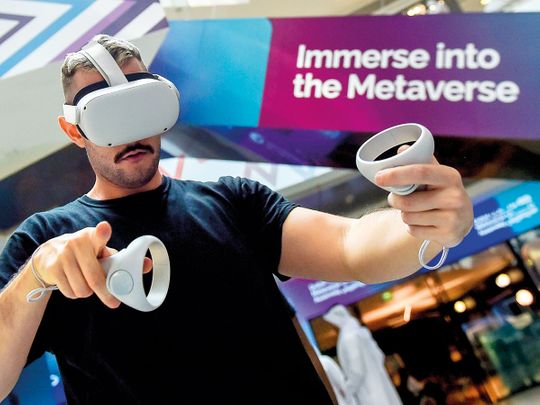Sustainability seeks to improve our lives on earth — from the air we breathe and the food we eat, to overcoming the perils of climate change. Meanwhile, the metaverse promises an escape from all earthly realities.
Understandably, any discussion on sustainability in the metaverse may seem more distraction than solution, but recent developments prove contrarian while still-evolving aspects reveal how this premise holds more than passing interest.
A movement is afoot to make everything in the universe more sustainable, and as it makes its way into the metaverse, the UAE runs ahead and stands tall. Experts now define domestic prowess that can propel a new global order.
Mining without moving mountains
The impact of the Ethereum organisation’s merger with The Beacon Chain in September, and their transition technology upgrade, is yet to truly awe the world. The new proof-of-stake system has reduced Ethereum’s energy consumption by an astonishing 99 per cent, a fact best explained by documentary photographer Eyal Ben Dror on the World Economic Forum’s (WEF) blockchain portal: “Compare the Ethereum organisation to an imaginary transportation conglomerate with a worldwide 25 per cent overall market share. Imagine it replacing all its fuel engines with zero-emissions engines, overnight.”
Energy usage elicits the harshest criticism of the cryptocurrency industry. Most networks use the older proof-of-work for mining new coins, and computing power used in these transactions is so gigantic it equals that of small countries. Ethereum moving its blockchain to proof-of-stake is sustainability in action: smaller carbon footprint, quicker operations, lower pricing, and the ability to attract more users.
The Ethereum NFT market share is about three-quarters of the entire NFT market, and conscientious artists and investors can now find crypto platforms and NFT marketplaces that are committed to sustainable solutions.
The UAE’s beacon is Nifty Souq, the region’s first NFT marketplace. “We handpicked our blockchain technologies – Algorand, Ethereal and Polygon – to ensure sustainability and cost-efficiency,” says, Co-founder Talal Al Afghani. “Another sustainable aspect is lazy minting, where a creator can register an NFT for free; the gas fee is paid by the buyer, and only upon purchase.”
As technology continues to evolve, gas fees are becoming nominal, he explains. “Right now, the energy used to create an NFT on Nifty Souq is the same as sending a tweet.” The platform is simple and inclusive enough to be used by his young son and his elderly parents, he adds.
Jurisprudence from UAE jurisdictions
Neither is the metaverse restricted to NFTs and cryptos, nor is energy consumption restricted to their minting and mining. The universal goal of energy conservation is finding fast fulfilment in the metaverse arena. In fact, it can absorb earthly actions associated with high energy, as the UAE is poised to prove.
Last month, Abu Dhabi Global Market (ADGM)’s Arbitration Centre launched the world’s first mediation service in the metaverse. While this increases reach and effectiveness, it also revolutionises global delivery of mediation: eliminating travel to in-person meetings makes this a sustainable, next-generation approach to international dispute resolution. ADGM has since launched Abu Dhabi Crypto to introduce progressive frameworks and regulations.
In other outstanding national examples, Abdulla bin Touq Al Marri, UAE Minister of Economy announced launched a third, virtual office for the ministry, calling the metaverse “a new economic equaliser.” Sharjah Commerce & Tourism Development Authority (SCTDA)’s launch of the world’s first real city-scale metaverse, Sharjahverse, gives Emiratis the opportunity to work at Sharjah’s famous landmarks in the metaverse. Dubai Municipality plans to build a virtual city to provide residents with an alternative reality to meet people and exchange ideas.
September’s launch of the Dubai Metaverse Assembly attracted more than 500 participants in an astonishing diversity of ministers, managing directors and decision makers sharing insights on how to unlock the metaverse for the good of humanity.
From the universe to the metaverse
On the surface, the global juggernaut of the sustainability movement may seem to have ignored the virtual world but in reality, the metaverse is being shaped by sustainability, with the ability to turn material consumption on its head.
Saeed Basweidan, Emirati engineer and tech-savvy entrepreneur, held many C-Suite governmental positions before pursuing his passions. Apart from his consulting role for national data centres, his Dubai-based company, YHH, is creating efficient designs and bespoke solutions for business through a data-driven approach.
Basweidan says the building blocks of the metaverse will see rapid growth. “Date centres have two crucial aspects – internal connectivity and interconnectivity between data centres. This calls for lower latency, higher bandwidth, and reduced carbon footprint, all of which require significant investments. For instance, a current high of 10 gigs (gigabyte) will need to be scaled up to almost 100 gigs.”
The experience of leading sustainability projects throughout his career makes him an ardent advocate. “Building a sustainable metaverse is about making high investments now to reap huge benefits later. Take employment as an example: millions of new jobs on the metaverse will reduce onus on governments, and bring about societal change,” he says.
“The UAE is always first and fast, and we have a futurist government leading the charge. This will later lead to regional growth.”
Pixels to eliminate planet-damaging stuff
It is a logical conclusion that the metaverse must cause less environmental harm than all its predecessors. A good starting point is design, says Musfir Khawaja. Co-founder of nftONE, a marketplace that connects the world to the Middle East’s unique digital assets. “The concept of 3D human-digital interaction is not new, but only the metaverse shows us how it truly looks. Here, creators have absolute freedom to design experiences that are inspirational and tickle the human urge to innovate.”
He outlines the possibilities for education and professional education: “Metaverse designers can make a huge impact by allowing children to collaborate and shape a sustainable world – for instance, a WEF lead programme that allows bright minds from around the world to connect and showcase solutions.
“Professional education is another undisputed winner,” he says. “Just like today’s airline pilots are trained on 3D simulators before they fly, the next generation of structural engineers, interior designers and machinery operators will get trained in the metaverse’s 3D environment. It will enhance their understanding, shorten the learning curve, and be inexpensive and accessible, making it economically and socially sustainable,” he points out.
Evolution of inclusive societies
Accessibility, affordability, diversity, neutrality, inclusion, and collaboration are facets of social sustainability, and Alla Maria Musnicka, Creative Director and Pre-Metaverse Officer at Nifty Souq, is zealous about entrenching them in the metaverse. “I am proud to be living in the UAE; we are already a global hub for the metaverse community, and we will soon be a top global metaverse economy,” says the young Latvian. “We get so many early opportunities to make the metaverse a better place.”
Of multiple causes, she wants to help them gain greater social impact. “There is enormous, untapped potential for charities and non-government organisations in the metaverse. With a clear road map and the power of blockchain, it will convert passive donors to active participants in causes of their choice.”
Musfir Khwaja seconds this: “We can design sustainable experiences inside the metaverse that are gender-neutral and inclusive of all social, religious, and ethnic backgrounds, and build social hubs that promote collaboration and accept opposing viewpoints.”
Saeed Basweidan says the metaverse will open dozens of doors for those in distress. “If we examine its reach, access, neutrality and anonymity, the metaverse will become a lodestone for social sustainability, especially in the many fields of counselling. Imagine being able to visit a café, log in, and get professional help instantly.
Read More: news.google.com













 Bitcoin
Bitcoin  Ethereum
Ethereum  Tether
Tether  Solana
Solana  XRP
XRP  Dogecoin
Dogecoin  USDC
USDC  Cardano
Cardano  Lido Staked Ether
Lido Staked Ether  Avalanche
Avalanche  TRON
TRON  Toncoin
Toncoin  Stellar
Stellar  Wrapped stETH
Wrapped stETH  Shiba Inu
Shiba Inu  Wrapped Bitcoin
Wrapped Bitcoin  Polkadot
Polkadot  Chainlink
Chainlink  Bitcoin Cash
Bitcoin Cash  WETH
WETH  Sui
Sui  Pepe
Pepe  NEAR Protocol
NEAR Protocol  LEO Token
LEO Token  Uniswap
Uniswap  Litecoin
Litecoin  Wrapped eETH
Wrapped eETH  Aptos
Aptos  Hedera
Hedera  Internet Computer
Internet Computer  USDS
USDS  Cronos
Cronos  Ethereum Classic
Ethereum Classic  Bittensor
Bittensor  Render
Render  POL (ex-MATIC)
POL (ex-MATIC)  Ethena USDe
Ethena USDe  Artificial Superintelligence Alliance
Artificial Superintelligence Alliance  Arbitrum
Arbitrum  Filecoin
Filecoin  Bonk
Bonk  Celestia
Celestia  Dai
Dai  Stacks
Stacks  WhiteBIT Coin
WhiteBIT Coin  Algorand
Algorand  Cosmos Hub
Cosmos Hub